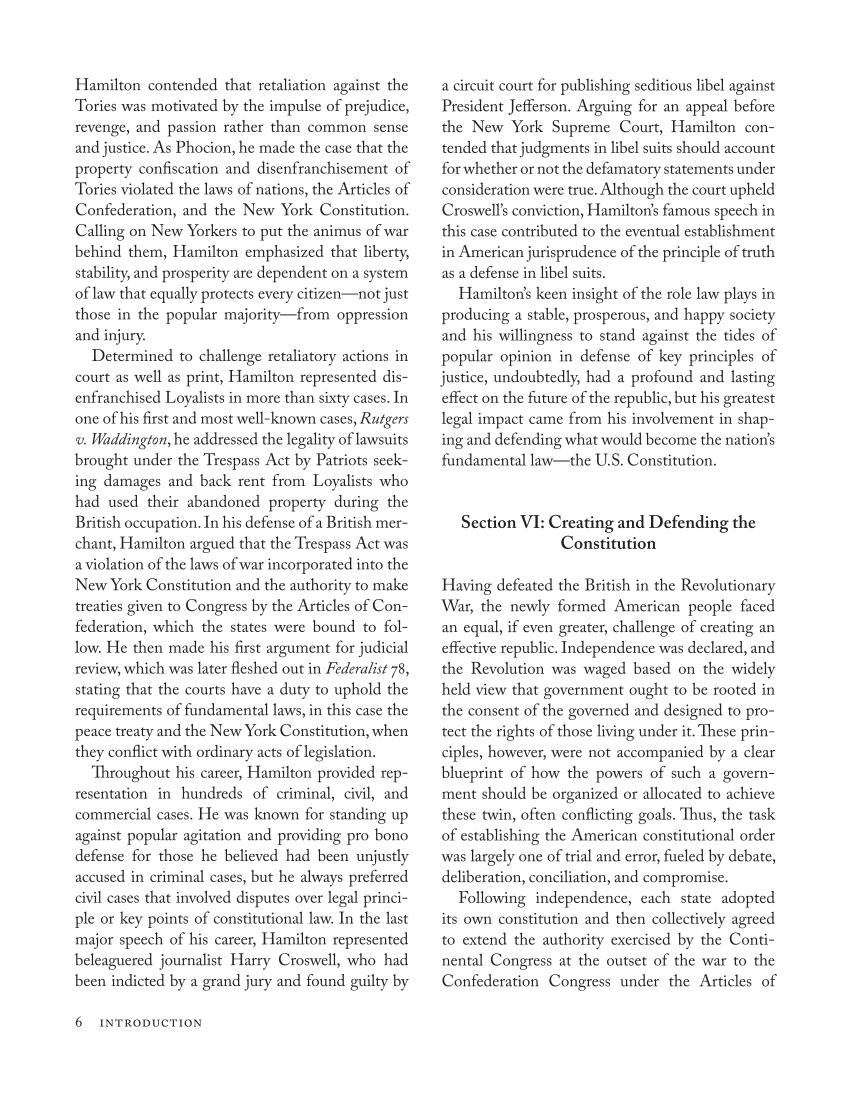6 Introduction Hamilton contended that retaliation against the Tories was motivated by the impulse of prejudice, revenge, and passion rather than common sense and justice. As Phocion, he made the case that the property confiscation and disenfranchisement of Tories violated the laws of nations, the Articles of Confederation, and the New York Constitution. Calling on New Yorkers to put the animus of war behind them, Hamilton emphasized that liberty, stability, and prosperity are dependent on a system of law that equally protects every citizen—not just those in the popular majority—from oppression and injury. Determined to challenge retaliatory actions in court as well as print, Hamilton represented dis- enfranchised Loyalists in more than sixty cases. In one of his first and most well-known cases, Rutgers v. Waddington, he addressed the legality of lawsuits brought under the Trespass Act by Patriots seek- ing damages and back rent from Loyalists who had used their abandoned property during the British occupation. In his defense of a British mer- chant, Hamilton argued that the Trespass Act was a violation of the laws of war incorporated into the New York Constitution and the authority to make treaties given to Congress by the Articles of Con- federation, which the states were bound to fol- low. He then made his first argument for judicial review, which was later fleshed out in Federalist 78, stating that the courts have a duty to uphold the requirements of fundamental laws, in this case the peace treaty and the New York Constitution, when they conflict with ordinary acts of legislation. Throughout his career, Hamilton provided rep- resentation in hundreds of criminal, civil, and commercial cases. He was known for standing up against popular agitation and providing pro bono defense for those he believed had been unjustly accused in criminal cases, but he always preferred civil cases that involved disputes over legal princi- ple or key points of constitutional law. In the last major speech of his career, Hamilton represented beleaguered journalist Harry Croswell, who had been indicted by a grand jury and found guilty by a circuit court for publishing seditious libel against President Jefferson. Arguing for an appeal before the New York Supreme Court, Hamilton con- tended that judgments in libel suits should account for whether or not the defamatory statements under consideration were true. Although the court upheld Croswell’s conviction, Hamilton’s famous speech in this case contributed to the eventual establishment in American jurisprudence of the principle of truth as a defense in libel suits. Hamilton’s keen insight of the role law plays in producing a stable, prosperous, and happy society and his willingness to stand against the tides of popular opinion in defense of key principles of justice, undoubtedly, had a profound and lasting effect on the future of the republic, but his greatest legal impact came from his involvement in shap- ing and defending what would become the nation’s fundamental law—the U.S. Constitution. Section VI: Creating and Defending the Constitution Having defeated the British in the Revolutionary War, the newly formed American people faced an equal, if even greater, challenge of creating an effective republic. Independence was declared, and the Revolution was waged based on the widely held view that government ought to be rooted in the consent of the governed and designed to pro- tect the rights of those living under it. These prin- ciples, however, were not accompanied by a clear blueprint of how the powers of such a govern- ment should be organized or allocated to achieve these twin, often conflicting goals. Thus, the task of establishing the American constitutional order was largely one of trial and error, fueled by debate, deliberation, conciliation, and compromise. Following independence, each state adopted its own constitution and then collectively agreed to extend the authority exercised by the Conti- nental Congress at the outset of the war to the Confederation Congress under the Articles of
Document Details My Account Print multiple pages
Print
You have printed 0 times in the last 24 hours.
Your print count will reset on at .
You may print 0 more time(s) before then.
You may print a maximum of 0 pages at a time.

























































































































































































































































































